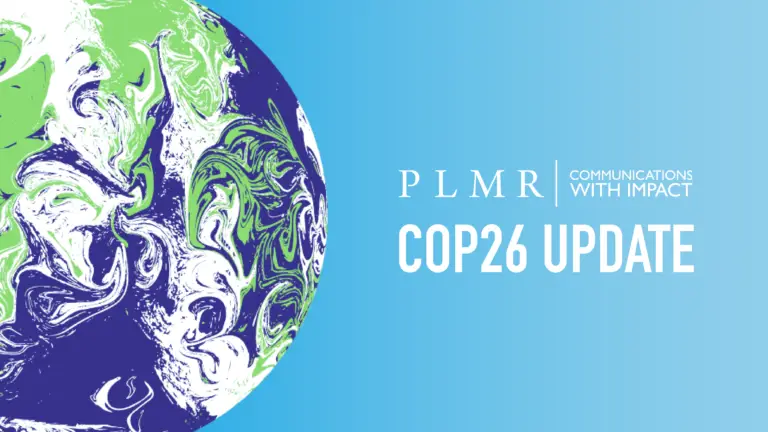Monday 1st November – The day that was
- COP 26 Meets Fyre Festival? Twitter was lit up over Sunday and Monday following travel chaos on Sunday, and long queues to get into the conference site. With several delegates having to fly to Glasgow following train trouble and precious time being lost in queues, organisers already seem to be facing an uphill battle to keep up expectations. It is understood challenges to enter the Blue Zone where the negotiations are taking place was due to UN protocol issues as the site is operated by the UN as official UN territory for the duration of the conference.
- Political leaders from around the world arrived at the summit. The main event was the opening ceremony hosted by Prime Minister Boris Johnson which featured many world leaders as well as cultural performances from Scottish artists and from around the world.
- On Monday leaders and negotiators got the opportunity to set out the existing actions which they have committed to, as well as hearing a range of presentations providing the latest scientific evidence on climate change.
- India’s Prime Minister Narenda Modi announced a 2070 net zero target, missing a key goal of the COP26 summit for countries to commit to reach that target by 2050. The target is backed by a ramped-up renewables goal for 500GW by 2030, when it will make up half of India’s energy supply.
- Meanwhile Vietnam announced a 2050 net zero target and Nepal moved forward its net zero emissions goal to 2045 – five years sooner than before.
- More than 100 world leaders were set to make a landmark pledge to end and reverse deforestation by 2030, in the COP26 climate summit’s first major deal.
- Strike action by GMB union members in Glasgow City Council’s street cleansing teams commenced on Monday following another round of failed negotiations. The strikes could lead to missed refuse collections and incomplete street cleaning, potentially providing some embarrassing pictures for the city.
Today’s theme: World leader’s summit – what to expect?
After all the countdowns, COP26 is now upon us. With over 120 world leaders in Glasgow for the event, the conference represents not only a major opportunity for climate action, but a key moment in international politics more broadly. It is one of the largest in-person gathering of world leaders and negotiators since the pandemic and of course the pressure to secure progress on tackling the climate crisis has never been higher.
Several key figures including Prime Minister Boris Johnson and US President Joe Biden arrived directly from the G20 in Italy. The reaction to discussions in Rome has been mixed. Italian Prime Minister Mario Draghi, who chaired the event, praised the final accord, saying that for the first time all G20 states had agreed on the importance of capping global warming at the 1.5 degrees Celsius level that scientists say is vital to avoid disaster. However, both Biden and Johnson expressed disappointment that more concrete agreements had not been secured, a view shared by many leading NGOs. A particular frustration was the non-attendance of Chinese President Xi Jinping and Russian President Vladimir Putin which other leaders highlighted as a lack of support for the wider plans. With neither the Russian nor Chinese leader expected in Glasgow, headline global agreements could be limited.
As with previous similar climate conferences, geopolitics will play a role and non-climate or unrelated bilateral issues could hold up progress. Tackling Covid-19 remains a key priority for countries across the world and ahead of the conference several commentators expressed concern that failure to deliver equitable global vaccine coverage or support for those worst affected by the pandemic could overtake climate discussions. Similarly, several countries have ongoing disputes which could threaten the overall success at COP26. For example, the United Kingdom’s disagreements over fishing rights with France, and increasingly the wider European Union, continued to escalate over the weekend. On Monday, UK foreign secretary, Liz Truss warned France it had 48 hours to back down on threats made in the row over fishing licences or the UK will begin dispute talks set out in the Brexit deal.
In terms of environmental policy, there is lots to watch out for from global leaders. It is expected that Russia, China, and Saudi Arabia will face pressure to make stronger commitments and clear plans with many arguing these countries must play a key role. For example, China and Saudi Arabia have only pledged to meet net zero emissions by 2060, a decade after the 2050 date many say is required and are therefore facing pressure to adjust their targets. Despite this, India’s commitment yesterday for carbon net zero by 2070 has suggested there may be additional national commitments over the conference. Although the 2070 target has been criticised as being too late, it is in line with what many climate experts have modelled as the most feasible scenario for India to achieve net zero. India’s shorter-term goals which include a 45% reduction in the carbon intensity of the economy have been praised with commentators suggesting the announcement by India will not only encourage other developing countries to set targets, but is also a clear rebuttal to developed countries to show that India is serious about tackling climate change.
Aside from India, the major announcement of the Conference so far is the $19.2 billion (£14 billion) deal by 100 world leaders to end and reverse deforestation by 2030. The countries who signed the deal cover around 85% of the world’s forests and committed to restoring damaged land and removing deforestation from the global trade of food, as well as supporting indigenous communities who live and rely on forests. The private sector has a major role with 30 of the biggest financial companies promising to end investment in activities linked to deforestation. The deal has been broadly welcomed as a major step forward on a difficult issue. However there have been warnings over how pledges around financial and land protection will be policed, whilst activists in Brazil have warned their leader Jair Bolsonaro, who signed the deal, cannot be trusted on climate commitments, given major deforestation projects undertaken by his government.
Global leaders also face pressure to fulfil the $100billion (£73 billion) needed to help poorer countries transition and adapt to climate change. Although the UK has admitted the $100 billion pledge is unlikely to be met at COP26, it is likely countries from around the world will be lobbying for commitments to additional funding, as part of recognising the impact of the more developed countries’ historic emissions. The UK has already committed to contributing a further £1 billion over 5 years, going from £11.6 billion in 2019 to £12.9 billion by 2025.
The UK domestic political scene has also been dominated by COP in recent days. Boris Johnson has sought to play a leading role, seeking to highlight his green credentials. He has been flanked by rising star Liz Truss and COP26 President Alok Sharma who will be looking to secure a new senior job in government following the Conference. Meanwhile Ed Miliband has been leading Labour’s response to COP26, calling on the government to meet Labour’s five demands. Alongside Miliband’s work, on Tuesday morning Shadow Environment secretary Luke Pollard criticised the COP26 deforestation deal claiming, ‘it doesn’t have any teeth.’ Mayors from across the UK, and indeed the world, have also descended on Glasgow. Mayor of London Sadiq Khan led a delegation of 12 mayors and sought
to use COP26 as an opportunity to highlight the success of London’s climate action so far, such as the city’s Ultra Low Emission Zone introduced last week. Greater Manchester Mayor Andy Burnham has also made the trip to COP26 to highlight his vision that climate action is ‘a chance to re-industrialise the North of England – in a clean way and creating new jobs.’
Ultimately, the success of COP26 and its impact on politics and the planet will be assessed on the outcomes of the conference and the agreements made. World leaders should be in no doubt that the world is watching COP26 and whilst efforts have been made to quell expectation, such as by Boris Johnson over the weekend, there is still significant hope for commitments and unity on what remains a crucial issue.





